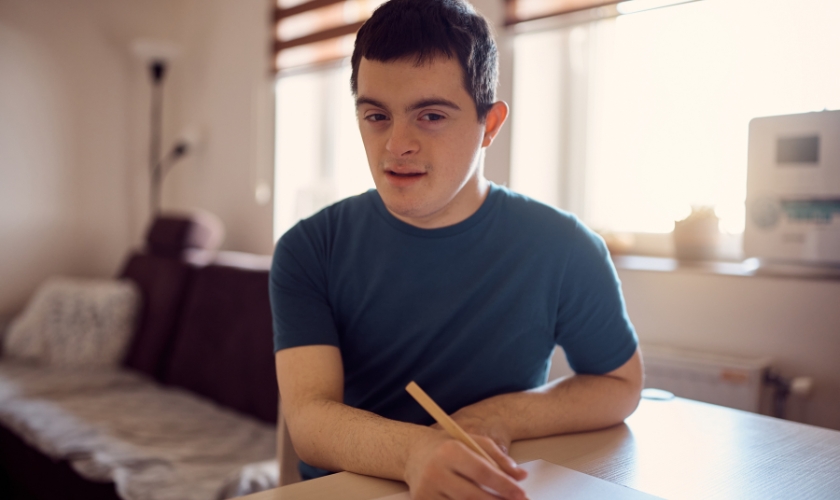10242 Greenhouse Rd #1002 Cypress, TX 77433
What Causes Delayed Speech in a Child?

It can be concerning when your child isn’t speaking as much or as clearly as other kids their age. Every child grows and learns at their own pace, but delayed speech can signal more than slow development. Understanding the causes of speech delays is the first step in helping your child find their voice.
1. Hearing Problems
Children learn to speak by hearing sounds around them. If they can’t hear properly, it makes sense that their ability to mimic sounds or develop language would be delayed. Ear infections, for example, can affect a child’s hearing, mainly if they’re recurring or go untreated. A child might have partial or complete hearing loss in more severe cases. Regular hearing checks can help rule this out or address it early, and in many cases, treating hearing issues can quickly improve a child’s speech development.
2. Developmental Disorders
Speech delays are sometimes linked to broader developmental conditions. Autism spectrum disorder (ASD) is one of the more common developmental issues associated with delayed speech. Children with ASD often struggle with communication, both in terms of understanding language and speaking themselves. It’s not that they don’t want to communicate, but rather that their brains process information differently. Early intervention, including autism treatment, can make a big difference in helping children with ASD improve their communication skills. Treatment might include speech, behavioral, and other supportive measures tailored to the child’s needs.
3. Oral-Motor Issues
Sometimes, delayed speech concerns how the brain communicates with the muscles used for speech. This condition, known as apraxia of speech, involves difficulty coordinating the mouth muscles to form words. It’s not that the child doesn’t know what to say, but their brain has trouble directing the muscles in their mouth to produce the correct sounds. This can lead to inconsistent speech patterns, where a child says a word correctly one day but struggles the next. In such cases, speech therapy strengthens motor coordination to help the child speak more clearly and consistently.
4. Learning Multiple Languages
If a child is growing up in a bilingual home, they may experience a speech delay. Their brain works twice as long to process two languages simultaneously. This can temporarily slow their speech development, but it’s usually nothing to worry about. Bilingual children typically catch up to their peers and benefit from speaking two languages fluently. However, if the speech delay persists beyond typical developmental timelines, it’s worth consulting a professional to rule out other factors.
5. Emotional or Environmental Factors
Believe it or not, a child’s environment and emotional state can significantly affect speech development. Children who experience stress or trauma, whether it’s due to family issues, bullying, or other life changes, might stop speaking as much. Likewise, if a child feels anxious or shy, they might refrain from talking in social settings. In such cases, speech delays may be temporary and related to how safe or comfortable the child feels in their surroundings. Creating a supportive environment where children feel heard and encouraged to communicate.
6. Intellectual Disabilities
Delayed speech can also be a symptom of intellectual disabilities, where the child’s overall cognitive development is slower than usual. Children with intellectual disabilities may take longer to grasp language concepts and communicate verbally. It’s important to note that speech delay doesn’t automatically mean a child has an intellectual disability. However, if other developmental challenges accompany delayed speech, a more comprehensive evaluation might be needed to determine the cause.
7. Lack of Interaction or Stimulation
Children learn language from the people around them. If a child isn’t exposed to enough verbal interaction or is rarely spoken to, their language skills can lag. Babies and toddlers thrive on communication, whether it’s through direct conversation, reading aloud, or simply listening to the people around them. A lack of social interaction or limited language exposure can lead to delayed speech. Encouraging more conversations and engaging with the child through stories, songs, and games can help stimulate language development.
Recognizing the Signs and Seeking Help
While every child is unique and develops at their own pace, there are certain milestones to watch for. If your child isn’t babbling by 12 months, has trouble imitating sounds, or isn’t saying simple words by age 2, it might be time to consult a pediatrician. The earlier speech delays are identified, the more effective interventions like speech therapy and autism treatment can be.
Professionals will assess your child’s overall development to see whether there are any underlying conditions, such as hearing problems or autism spectrum disorder, that could be contributing to the speech delay. With the proper support, most children can progress significantly in their speech and language skills over time.
Treatment Options: Speech Therapy and Autism Treatment
Speech therapy is one of the most common treatments for children with delayed speech. A speech therapist works one-on-one with the child to improve their ability to articulate sounds, form words, and understand language. Therapy might include exercises that build muscle coordination in the mouth or games that encourage conversation and verbal expression.
For children diagnosed with autism spectrum disorder, treatment is more comprehensive. Autism treatment often includes a combination of therapies, such as applied behavior analysis (ABA), occupational therapy, and social skills training, alongside speech therapy. The goal is to address both the communication challenges and the broader social and behavioral difficulties that can come with ASD. Early diagnosis and intervention can substantially impact a child’s ability to develop practical communication skills and thrive in social settings.
Encouraging Speech Development at Home
While professional support is essential, there are plenty of ways parents can help their children develop speech at home. Here are a few tips:
Talk to your child often: Even if they don’t talk back, speaking regularly helps them learn how language works.
Read together: Reading books aloud introduces your child to new words and ideas while creating a bonding experience.
Be patient: Children with speech delays may get frustrated when they can’t communicate effectively. It’s essential to be patient and offer encouragement and positive reinforcement.
Limit screen time: Excessive screen time can reduce a child’s human interaction, negatively affecting speech development. Encourage playtime and conversations instead.
Speech delay can be stressful for parents, but it’s important to remember that many children with delayed speech go on to develop strong communication skills with the proper support. Whether the cause is hearing issues, developmental challenges, or environmental factors, plenty of resources are available to help your child overcome speech difficulties. By staying informed and seeking the appropriate treatments, including autism treatment if necessary, you can help your child find their voice and thrive in social situations.




